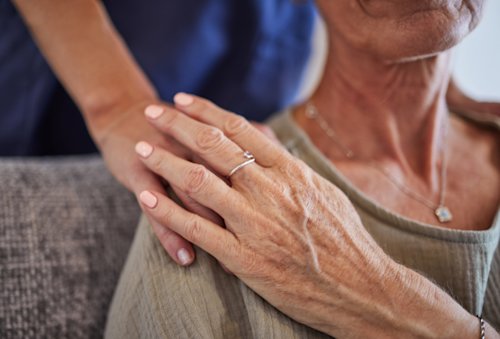An end-of-life or death doula is also known as an end-of-life care worker who provides support to people who are dying. They offer emotional, spiritual, and practical help, offering people guidance on ways to cope with their approaching death, helping them to reflect on the life they have lived and even planning their funeral.
The word doula comes from the Greek word for a female servant and was traditionally used to describe someone who helps women bring their babies into the world. More recently, the term has also been used to describe someone who helps people through the end of their life.
An end-of-life doula is not typically a medical professional, but will work closely with a person’s healthcare team to make their death as comfortable as possible. They can work in people’s own homes, hospices, hospitals and care homes, and are often engaged by the family of the person who is dying.
The support of an end-of-life doula can last for varying lengths of time. Some people seek support as soon as they have been diagnosed with a life-limiting illness. Others may not want support until their final weeks of life. Doulas sometimes also support a person's family after their bereavement.
Why do people have an end-of-life doula?
People choose to have an end-of-life doula for practical as well as emotional and spiritual reasons. Their role is to give a dying person a more positive end-of-life experience than they would have had without the extra support.
The website for Marie Curie, the UK’s leading end of life charity, says: “When someone feels supported, pain-free, and able to express any final worries and wishes at the end of life, this can help bring peace to the dying process.”
On a practical level, an end-of-life doula can take on everyday chores - shopping or walking the dog - to allow family and friends to concentrate on spending their time with the person who is dying.
More directly, an end-of-life doula can be there to listen to the person who is dying and offer them emotional and spiritual support. As well as offering a friendly, non-judgemental ear, they can also help talk through decisions that need to be made and make sure final wishes are heard and passed on.
How to find an end-of-life doula
It may be possible to ask your local hospice or hospital if they have any recommendations, however, End of Life Doula UK is the main membership organisation for end-of-life doulas in the United Kingdom.
Founded in 2018, the association provides a central point of contact for individuals and healthcare professionals seeking end-of-life-doula support in Britain. The website has a simple contact form that you can use to ask for more information about the support available. Soon after you have submitted the form, someone will be in touch to see how they can be of help and connect you with the most suitable doula available.
The website also shows a selection of the doulas who are members of the association. All of the association’s members have to be undergoing or completed the Living Well Dying Well training programme for end-of-life doulas. Members must also follow the association's professional standards.







